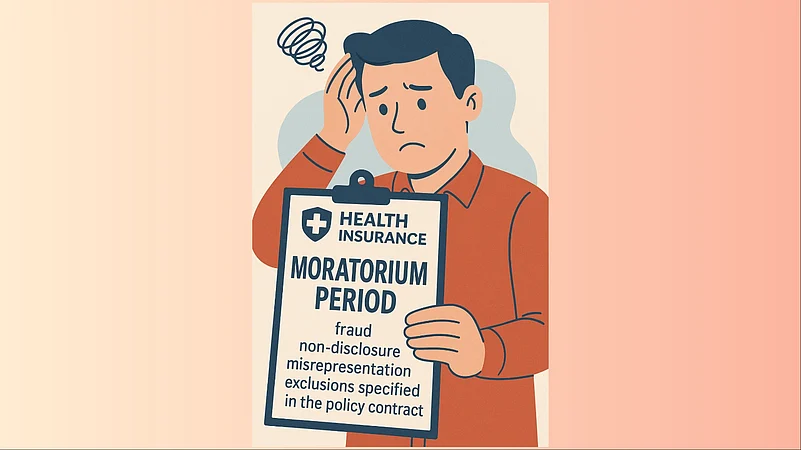By now, many health insurance policyholders would assume that if their policy has run uninterrupted for five years, they are on safe ground. After all, according to the new rule by the Insurance Regulatory and Development Authority of India (Irdai), effective from April 1, 2024, insurers can no longer reject claims on the basis of non-disclosure or misrepresentation once the ‘moratorium period’ ends, unless they can prove fraud.
However, a recent review of insurance policies by Beshak.org, an insurance advisory firm, suggests that some insurers have not updated their wordings to reflect this change.
And that’s a problem for the policyholders. When policy contracts do not align with the regulator’s rules, it’s the customer who gets caught in the crossfire since they may not be able to go into details of the fine print and could be denied claims.
What is the Moratorium Period
Policyholders are likely to confuse moratorium period with other industry jargons, such as free-look period, waiting period, pre-existing condition limits, etc. However, moratorium period plays a different role.
A moratorium period is essentially a five-year look-back shield for policyholders. If you have maintained continuous coverage for 60 months, your insurer can no longer raise questions about errors or omissions in your original disclosure form, unless they can prove you that you committed a fraud.
Before 2024, this protection kicked in only after eight years. However, the insurance regulator, the Insurance Regulatory and Development Authority (Irdai) brought this window down to five, giving policyholders enhanced protection and holding insurers more accountable for doing their due diligence upfront.
Where’s The Catch
According to Beshak.org’s audit of policy documents across 30 health insurance companies, most insurers (including both general and standalone health companies), 28 out of 30, have aligned with the updated rule. Their documents clearly state that after 60 months, claims can only be denied on grounds of fraud or if the claim falls under a permanent exclusion (which is a fair notion, because those are conditions never covered in the first place).
However, two insurers, namely Star Health and Galaxy Health, still appear to be holding on to outdated or misleading wording in their policies.
Here’s the clause they use: “After the expiry of the Moratorium Period, no health insurance claim shall be contestable except for proven fraud, non-disclosure, misrepresentation and exclusions specified in the policy contract.”
The problem with this phrase is that by listing non-disclosure and misrepresentation separately from fraud, these wordings imply that even after the five-year moratorium, a claim can be challenged on those grounds, regardless of whether there was any intent to deceive.
Irdai’s directive on this matter, however, is clear. Once the moratorium period ends, non-disclosure and misrepresentation can only be grounds for claim rejection if they amount to fraud.
Also, under Indian law, specifically Section 17 of the Indian Contract Act, 1872, fraud has a very specific definition: it must involve deliberate deception. Forgetting to disclose something or making an honest error should not qualify or be the basis of claim rejection.
Why Does This Matter
The proper understanding of this clause is significant because its misrepresentation quietly shifts the burden back onto the customer, after the five-year protection period has lapsed.
In practice, this could mean valid claims being challenged or denied based on technicalities that are no longer supposed to matter.
The moratorium period was designed to level the playing field since most policyholders will not have perfect medical records at the time of buying a policy. People may forget to mention a past surgery from 15 years ago or not realise a condition needed to be disclosed. During the moratorium, insurers have the right to investigate these disclosures. After the moratorium, that window should close, unless there is proof of intentional fraud.
More importantly, this clause nudges insurers to do more accurate and thorough underwriting at the time of issuing the policy, rather than dig up old records and doctor’s notes at the time of a claim.
What Can You Do
For policyholders, especially those with long-running policies, it is important to check the latest wordings in their health insurance documents. If your policy is over five years old and the insurer has still kept “non-disclosure” or “misrepresentation” listed separately from fraud as reasons to reject claims that should be taken as a red flag.
This might also be a good moment to raise concerns with your insurer, or, if necessary, file a grievance with Irdai.
The bigger point here is this: rules that exist on paper don’t mean much if they are not reflected in actual practice. And while most insurers seem to be following the moratorium rule correctly, even a couple of outliers could set the wrong precedent. For something as crucial as health insurance, customers shouldn’t have to double-check if their policy respects regulatory safeguards. But until that becomes the norm, it’s probably wise to do just that.














